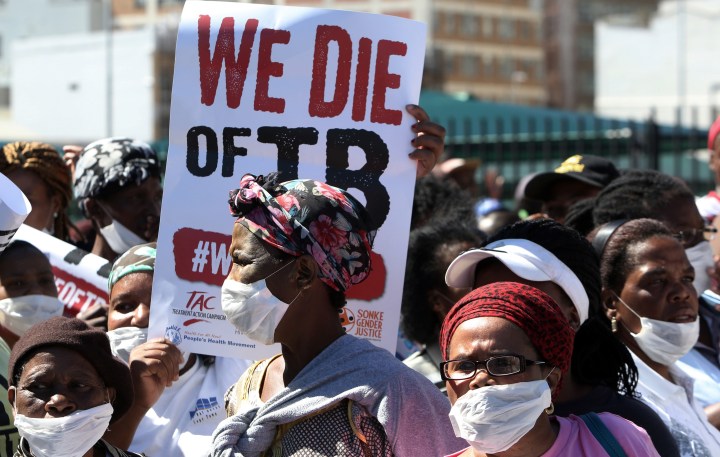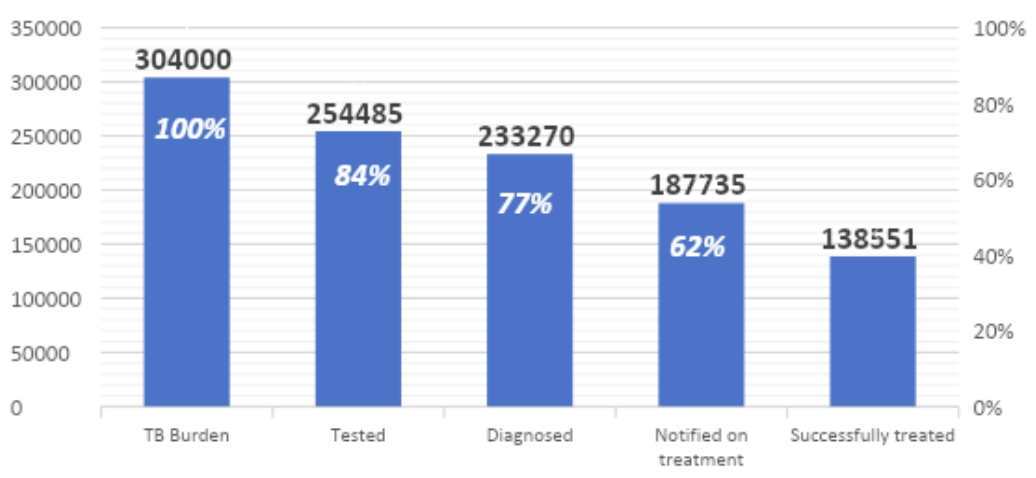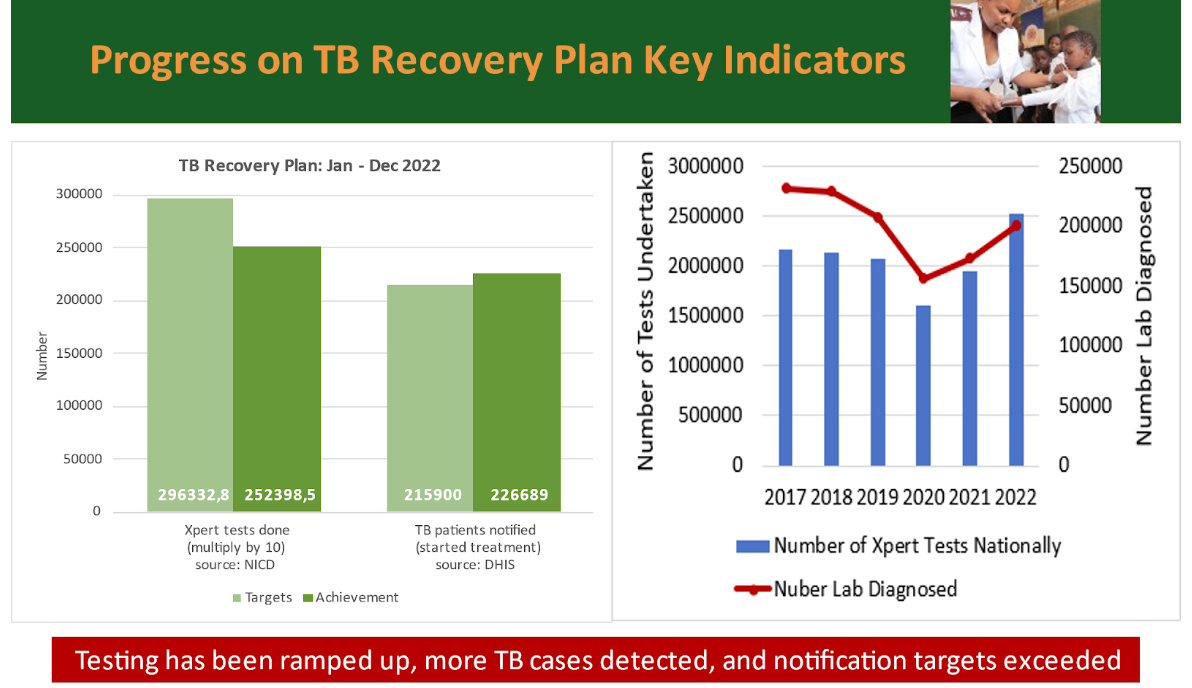TB OR NOT TB OP-ED
National TB Indaba reveals way forward for retaking control of tuberculosis after Covid-19 setbacks

TB killed more than 56,000 people in South Africa in 2021 according to the World Health Organisation. In the same year, the WHO estimated that there were over 304,000 new TB infections. South Africa is one of the highest-burden countries in the world. The impact of TB — often forgotten — on individuals, families and the country’s health system and its economy is significant and requires increased focus.
On 20 June, 2023, the day before the start of the South African Aids conference, the national Department of Health hosted a TB Indaba attended by the Minister of Health, the Director General for Health, a number of MECs for Health, a few members of the national assembly, senior officials of the national and provincial Departments of Health and representatives of civil society, the private sector and non-governmental organisations.
The objectives of the meeting were to assess progress in the implementation of the TB recovery plan and to explore areas in which the programme could be strengthened.
TB is a major contributor to the burden of disease in South Africa with an estimated 304,000 new infections annually in 2021 according to the World Health Organization’s Global Tuberculosis Report. In addition, it is estimated that there were 56,000 deaths from TB. South Africa is one of eight countries that are considered high-burden countries globally.
While the country has made some progress in decreasing the burden of disease and is an early adopter of new diagnostics (e.g. GeneXpert) and new drugs (e.g. Bedaquiline), the Covid-19 pandemic has pushed back progress. In 2020 compared to 2019 there were 26% fewer GeneXpert tests conducted which means that a significant number of people with TB were not tested, not initiated in treatment and therefore were transmitting TB to people in their homes and workplaces.
In response to the challenges posed by the Covid pandemic, the Department of Health developed a TB Recovery Plan which was recently updated. The Plan responds to the data, as in the figure below, which reflects the state of the national TB programme with 62% of the estimated 304,000 people with new TB infections on treatment and 46% successfully treated.

The Indaba was informed that there has been some recovery post the acute phase of the Covid-19 pandemic as reflected in the graphs below. In 2022, over 2.5 million Genexperts tests were conducted and 226,689 people with TB were notified. The TB Programme exceeded the notification target of 215,900 people with TB. The number of tests conducted last year is higher than the number conducted in 2019. This indicates that the recovery has commenced although the targets have not yet been achieved.

The TB Recovery Plan 2023-2024
The TB Recovery Plan (2023-2024) includes seven goals that attempt to address the challenges in the programme and includes:
- demand creation for TB testing to find the estimated 80,000 people with TB who are not diagnosed;
- accelerate implementation of target universal TB testing focusing on high risk groups;
- strengthening linkage from diagnosis to treatment;
- improving retention in care;
- strengthening the prevention of TB;
- strengthening the TB programme in the mining sector; and
- improving TB data systems, governance and accountability.
In opening the Indaba, the Minister of Health noted the impact of the Covid-19 pandemic on the TB results and asked stakeholders to reflect on progress as well as challenges and to recommit to meeting the TB targets. Minister Phaala also noted the need for more communication around TB as well as the need to strengthen data systems.
The Indaba addressed four major areas related to the Plan. These were: innovations in diagnostics, treatment and prevention; the role of the private sector; strengthening the TB programme in the mining sector; role of civil society; and cross-border issues.
The Indaba acknowledged that South Africa could learn lessons from its earlier experiences in being early adopters of innovations. There is currently no point-of-care diagnostics for TB (unlike the rapid tests for HIV and more recently for Covid-19).
However, there was some promising research with tongue swabs which will enable people to take their own sample for TB testing in a laboratory.
On new TB medicines, it is possible to successfully treat people with drug-susceptible TB over a four-month period (instead of six months) and people with drug-resistant TB for six months rather than nine to 12 months. Shortening the treatment period will improve patient adherence to treatment and decrease onward transmission of TB. Shorter treatment regimens are more acceptable, better tolerated with a greater chance of treatment completion.
In addition, there are several possible TB vaccines being researched with one (the M72/AS01E tuberculosis vaccine candidate) in phase three trials with final results due in 2029 and another vaccine in phase one trial.
Read more about TB vaccines here: Tuberculosis Vaccines – IAVI
Local research shows that the private health sector can play a role in treating people with TB disease. The private sector (doctors, pharmacists and occupational health nurses) was also interested in expanding their role in supporting the TB programme by diagnosing and treating drug-susceptible patients.
The costs of treating TB in the private sector could be reduced by diagnosis being conducted by the National Health Laboratory Service (as for public patients) and by the state making the medicines available to the private sector.
While there was acknowledgement that through the efforts of mine owners, unions and the government, the regulated mines were doing well in treating TB in miners, this was not the case in peri-mining communities as well as families of miners. It was also noted that more needed to be done to find and treat TB in other workplaces. Increased focus on TB in the workplace (including public sector workplaces) could make a significant difference in decreasing the TB burden in the country.
The issue of TB in the mines is related to cross-border and mobile populations within the country and between countries that are considered ‘labour-sending’ in southern Africa. The World Bank labelled the impact of TB in this region as an “invisible crisis that has eroded economic development”.
The Indaba noted the importance of addressing TB in mobile populations and called for the development of a strategic plan.

According to the World Health Organisation’s Global Tuberculosis Report, an estimated 304,000 new infections were reported in 2021 in South Africa. (Photo: medicinenet.com/myhealth1st.com. / Spotlight)
Involving and mobilising communities is critical to the success of any health challenge and TB is no exception. Representatives of civil society organisations at the Indaba noted previous campaigns led by civil society organisations and TB champions like Prince Zulu (and his work amongst hostel dwellers), the actor Sello Maake ka Ncube as well as unions like the National Union of Mineworkers and the National Union of Metal Workers. There was a call for greater involvement of local organisations in the response to the TB epidemic.
In addition to the Minister’s call for better TB data systems to ensure more effective monitoring of the TB programme, similar calls were made by civil society who argued for the need to ensure, regardless of who is collecting data, that one national information system should be used. In addition, the group that explored new innovations called for a bridge to be built between the existing Tier.net system which collects TB and HIV data with the envisaged electronic medical record which is currently under development.
While TB can affect anyone — as long as one breathes one can contract TB — the areas of the country that have the largest burden are the metros which have the largest populations. This means that our most intensive efforts need to be in the metros and the other large districts with the largest burden of disease from TB.
The TB Indaba was a unique opportunity for the TB community in the country to reflect honestly on the progress that has been made as well as the continuing challenges. The recommendations from the Indaba need to be taken forward with urgency to ensure that the country can make significant progress towards the END TB targets: reduce TB incidence by 80%, TB deaths by 90% and eliminate catastrophic costs for TB-affected households by 2030. DM
Norbert Ndjeka is the chief director of the National TB Programme and Honorary Associate Professor, Department of Medicine, University of Cape Town. Yogan Pillay is director for HIV and TB delivery at the Bill and Melinda Gates Foundation and extraordinary professor in the Division of Health Systems and Public Health, Stellenbosch University.





















 Become an Insider
Become an Insider
Comments - Please login in order to comment.